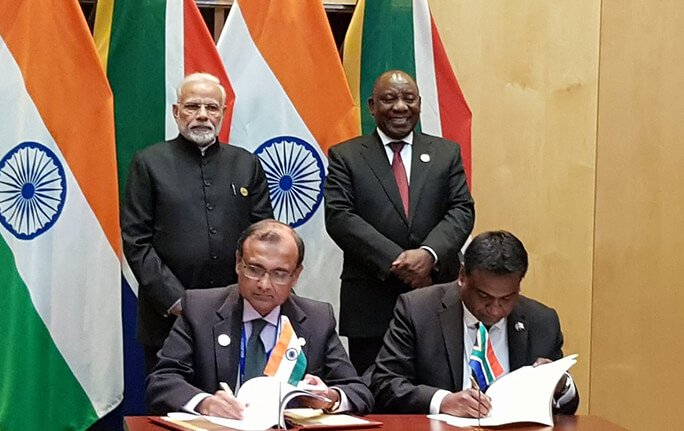South Africa stands at a historic juncture as the results of the recent election usher in a new era of governance. The coalition government, a product of the people’s mandate, now prepares to take the reins of power, promising both challenges and opportunities for the nation. As the dust settles on the election fervor, the spotlight shifts to the outlook of this coalition government and how it may shape South Africa’s future.
The ANC, Africa’s oldest liberation movement, faced its worst election outcome in 30 years, securing 40.2% of the vote compared to 57.5% in 2019. The Democratic Alliance (DA) received 21.6%, while uMkhonto we Sizwe (MK), led by former President Jacob Zuma, attained 14.7%, drawing support from the ANC.
Following the announcement of the results, President Cyril Ramaphosa addressed the nation, stating, “Our people expect all parties to collaborate within the framework of our Constitution and address challenges peacefully and in accordance with the rule of law.”
Ramaphosa urged political parties that won seats in the election to find common ground, overcome differences, and collaborate for the good of everyone and the country.”
Jack Hofmeyr, a South African politician, revealed to media outlets that the ANC has several options for forming a coalition government, as this is the first time it is doing so. He stated that it is inconceivable for the ANC to form a coalition with former President Jacob Zuma’s MK party, which has indicated that it will not negotiate with the ANC while Ramaphosa is still president. Hofmeyr ruled out a partnership between the ANC and the MK party, noting that almost 14.5% of the votes the MK party received are from only three provinces, indicating that it is not a party represented across the country.
Regarding the EFF, which has expressed readiness to engage in talks with the ANC, Hofmeyr suggested that the ANC will consider various factors, including the EFF’s leadership and its reliability as a coalition ally. He noted the EFF’s history of confrontational behavior in parliament, where it often disrupted proceedings as an opposition party.
Public policy expert Kagiso “TK” Pooe told local media that a government of national unity might only succeed if it is based on clear goals that all parties can agree upon. He emphasized the importance of economic recovery and employment promotion as primary objectives. Additionally, he highlighted the need to address institutional corruption and inefficiency. Pooe warned that without a commitment to these objectives, the coalition would always be at risk of failure and collapse.
Insights from The Past
South Africa experienced a Government of National Unity from 1994 to 1997, with Nelson Mandela appointing FW de Klerk, a former apartheid-era Prime Minister, as his deputy. Cabinet ministers from the National Party and the Inkatha Freedom Party (IFP), then rivals of the African National Congress (ANC), were also included.
Now, after the ANC’s disappointing performance in the May 29 election, dropping from 57 percent in 2019 to 40 percent, the party must negotiate with others before the June 18 deadline to elect the next president. The ANC lost its majority in key provinces like KwaZulu-Natal and Gauteng.
Party leaders are discussing viable government formation options, with some youth organization members protesting against a potential deal with the DA. Exclusive agreements with the DA, EFF, or the MK Party led by Jacob Zuma could lead to internal conflicts. The MK Party stated it would only collaborate with the ANC if Ramaphosa is removed. A grand coalition, including the DA and smaller parties, aims to avoid overdependence on any single partner
Obstacles Ahead
Proff, Ongama Mtimka, Political analyst, and lecturer at the Neslson Mendela University, stated that if the ANC forms an alliance solely with either the DA on the right or the EFF and MK Party on the left, it would significantly disrupt the internal balance of power within the ANC. This shift could, in turn, affect market perceptions of the South African government
He warned that if the ANC were to form an alliance with the DA, it could spark an internal rebellion, aligning with the right contradicts the liberation movement’s myths and traditions, he said.
Although the specifics of this broad government of unity have not yet been detailed, Ramaphosa stated that the new administration “will consider the conditions prevailing at this point in our country’s history.”
Ramaphosa stressed the urgency of social cohesion after a “toxic and divisive” election campaign. As ANC negotiators meet with other political groups, they insist that constitutionalism is a non-negotiable principle.
“In forming a Government of National Unity (GNU), we are building on a rich history of cross-divide cooperation,” he said. “This familiar experience served South Africa well and will now be tested again.”
Speculative Overview
Leadership Dynamics: The coalition would likely be led by a prominent figure from one of the major parties, possibly the ANC or a party with a significant share of the coalition’s seats. This leader would need to balance the interests and demands of the various coalition partners while maintaining stability and unity.
Policy Formulation: Policy development would involve negotiations and compromises among the coalition partners. It would likely result in a blend of different party agendas, aiming to address a broad spectrum of issues affecting South Africa, such as unemployment, healthcare, education, and economic growth.
Legislative Process: In parliament, the coalition government would need to work closely with all parties to pass legislation. This would require skillful negotiation and consensus-building to ensure that laws reflect the diverse interests of the coalition partners while serving the needs of the country.
Public Perception and Support: The success of the coalition government would hinge on its ability to demonstrate effectiveness and coherence to the public. Maintaining transparency, accountability, and delivering tangible results would be crucial in garnering support and trust from South African citizens.
Challenges and Opportunities: While coalition governments can bring diverse perspectives and expertise to the table, they can also face challenges such as internal disagreements, policy inertia, and balancing conflicting interests. However, if managed effectively, a coalition government could also present opportunities for innovative policymaking and governance.


